Celebrity parents have a way of surprising us — especially when it comes to their baby name ideas.
There aren’t many baby names shorter, sweeter and more popular than 4 letter girl names.
Take Mary and Lisa for example.
According to the Social Security Administration (SSA), Mary was the No. 1 most popular baby girl name in the U.S. over the past 100 years and was given to more than 2.9 million baby girls since 1924.
Lisa, which ranked No. 11 over that same span, was given to approximately 965,624 million baby girls.
But fast forward to today and we’re seeing a new generation of 4 letter girl names emerge in the U.S. — and it’s Emma that’s leading the way now.
Emma has been a top-5 girl’s name every year since 2002 and a top-2 girl’s name every year since 2012, per the SSA.
Luna (10th), Lily (20th), Aria (24th), Nora (25th) Mila (28th), Ella (32nd), Isla (33rd), Nova (35th), Lucy (40th) and Maya (50th) were the only other 4 letter baby girl names to rank inside the top-50 in 2023.
With so many beautiful 4 letter girl names to discover, here are some of the most popular today!
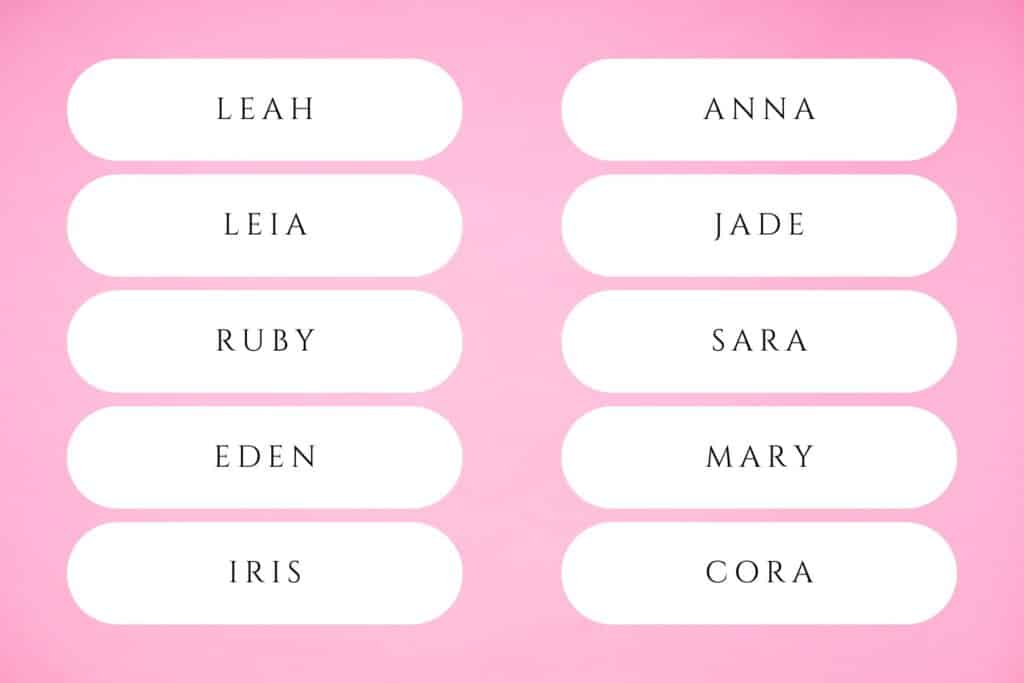
RELATED: 50+ Baby Names With a Hyphen for Your Little Girl
Leah
Origin: Hebrew; Old English
Meaning: Weary; Grieved; Meadow; Clearing
Leah, pronounced LEE-uh or LAY-uh, comes from the Hebrew name Le’a, which is likely derived from the Hebrew word la’a, meaning “weary” or “grieved.” It also directly comes from the Old English word leah, meaning “meadow” or “clearing.”
Leia
Origin: Hebrew; Old English
Meaning: Weary; Grieved; Meadow; Clearing
Leia, pronounced LEE-uh or LAY-uh, is the Portuguese form of Leah, which either derives from the Hebrew word la’a, meaning “weary” or “grieved,” or the Old English word leah, meaning “meadow” or “clearing.”
Ruby
Origin: Latin; English
Meaning: Precious red stone; July birthstone
Ruby, pronounced ROO-bee, comes directly from the name of the red precious stone made of corundum, which derives from the Latin word ruber, meaning “red.” Ruby is the traditional birthstone for July.
Eden
Origin: Hebrew
Meaning: Paradise; Delight
Eden, pronounced EE-den, derives from the Hebrew word eden, meaning "delight" or "paradise." In the Bible, Eden refers to the Garden of Eden — where the first humans, Adam and Eve, were placed.
Iris
Origin: Greek; English
Meaning: Rainbow; Flower; Eye color
Iris, pronounced EYE-ris, comes from the Greek word for "rainbow" and was the name of the Greek goddess for rainbows. It can also refer to the iris flower or the English word for the colored part of the eye.
Anna
Origin: Hebrew
Meaning: Grace; Favor
Anna, pronounced AN-nuh, is a variation of Hannah, derived from the Hebrew name Hanna and Hebrew word hanan, meaning "grace" or "favor." In the Bible, Anna is a prophetess mentioned in the Gospel of Luke.
Jade
Origin: Spanish
Meaning: Green gemstone; Stone of the flank
Jade, pronounced JAYD, refers to the green precious gemstone. Its name comes from the Spanish term piedra de la ijada (stone of the side), as the gem was believed to cure ailments in the area of the kidneys.
Sara
Origin: Hebrew
Meaning: Lady; Princess; Noblewoman
Sara, pronounced SAIR-uh, is a variation of Sarah and comes directly from the Hebrew word sara, meaning “lady,” “princess” and “noblewoman.” In the Bible, Sara is the wife of Abraham and mother of Isaac.
Mary
Origin: Greek; Hebrew; English
Meaning: Sea of bitterness; Wished for child; Beloved
Mary, pronounced MAIR-ee, comes from the Greek names Mariam and Maria, which are derived from the Hebrew name Miryam. The meaning is debated, but many experts suggest it means “sea of bitterness,” “wished for child” or “beloved.”
Cora
Origin: Greek; Latin
Meaning: Maiden; Goddess of spring; Heart
Cora, pronounced KOR-uh, derives from the Greek word kore, meaning "maiden" or "daughter." Kore is another name for Persephone, the Greek goddess of spring. It may also come from the Latin word cor, meaning "heart."
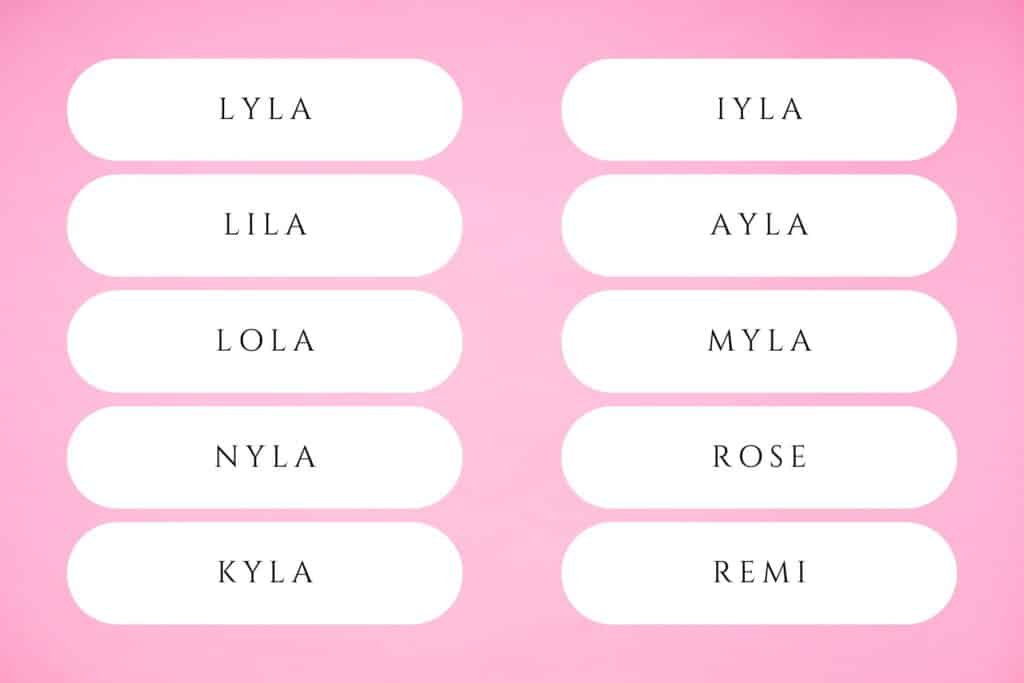
Lyla
Origin: Arabic
Meaning: Night
Lyla, pronounced LY-luh, is a variant of Layla, which comes from the Arabic word layla, meaning “night.” It was popularized by a character in the old Arab tale “Layla and Majnun,” notably retold by Nizami Ganjavi.
Lila
Origin: Sanskrit; Arabic
Meaning: Play; Amusement; Night
Lila, pronounced LEE-lah or LY-lah, comes directly from the Sanskrit word lila, meaning “amusement” or “play.” It can also be a variant of Leila and Layla, which comes from the Arabic word layla, meaning “night.”
Lola
Origin: Spanish
Meaning: Sorrows
Lola, pronounced LO-luh, originated as a Spanish diminutive of Dolores, which means “sorrows” and comes from the Spanish phrase Nuestra Señora de los Dolores (Our Lady of the Sorrows), a title for the Virgin Mary.
Nyla
Origin: Modern; Invented
Meaning: Hero; Cloud
Nyla, pronounced NY-luh, was likely popularized by similar-sounding names like Kyla and Lyla, but can also be a feminine form of the Irish element nia, meaning “hero,” or Old Irish element nél, meaning “cloud.”
Kyla
Origin: English; Gaelic
Meaning: Narrows; Channel; Strait
Kyla, pronounced KY-luh, was likely popularized by its sound, but can also be a feminine variant of Kyle, which derives from the Gaelic element caol, meaning “narrows,” “channel” or “strait,” making it a water name.
Iyla
Origin: Modern; Spanish; Sanskrit; Turkish
Meaning: Island; Earth; Speech; Moonlight
Iyla, pronounced EYE-luh, is a modern variant of names like Isla, meaning “island” in Spanish, and Ila, meaning “earth” and “speech” in Sanskrit. It can also be a variant of Ayla, meaning “moonlight” in Turkish.
Ayla
Origin: Turkish; Hebrew; English
Meaning: Moonlight; Halo; Terebinth tree
Ayla, pronounced AY-luh, is often linked to the Turkish root ay, meaning “moonlight” or “halo,” but can also derive from the Hebrew element ela, meaning “terebinth tree.” It was popularized by a character in “Clan of the Cave Bear” (1980) by Jean M. Auel.
Myla
Origin: English; Slavic; Latin
Meaning: Dear; Gracious; Soldier
Myla, pronounced MY-luh, is likely a modern variant of the name Mila, which derives from the Slavic element milŭ, meaning “dear” or “gracious.” It can also be a feminine variant of Miles, meaning “soldier” in Latin.
Rose
Origin: Latin; English
Meaning: Rose flower
Rose, pronounced ROHZ, derives from the Latin word rosa, referring to the rose flower known for its beauty and fragrance. Roses are universally recognized symbols of love, romance and passion.
Remi
Origin: English; Yoruba
Meaning: Settlement on the stream; The lord consoles me
Remi, pronounced REM-ee, is often used as a short form of Remington, which comes from an English place name in Lancashire, itself meaning "settlement on the Riming stream." It can also be a short form of the name Oluremi, meaning “the lord consoles me” in Yoruba.
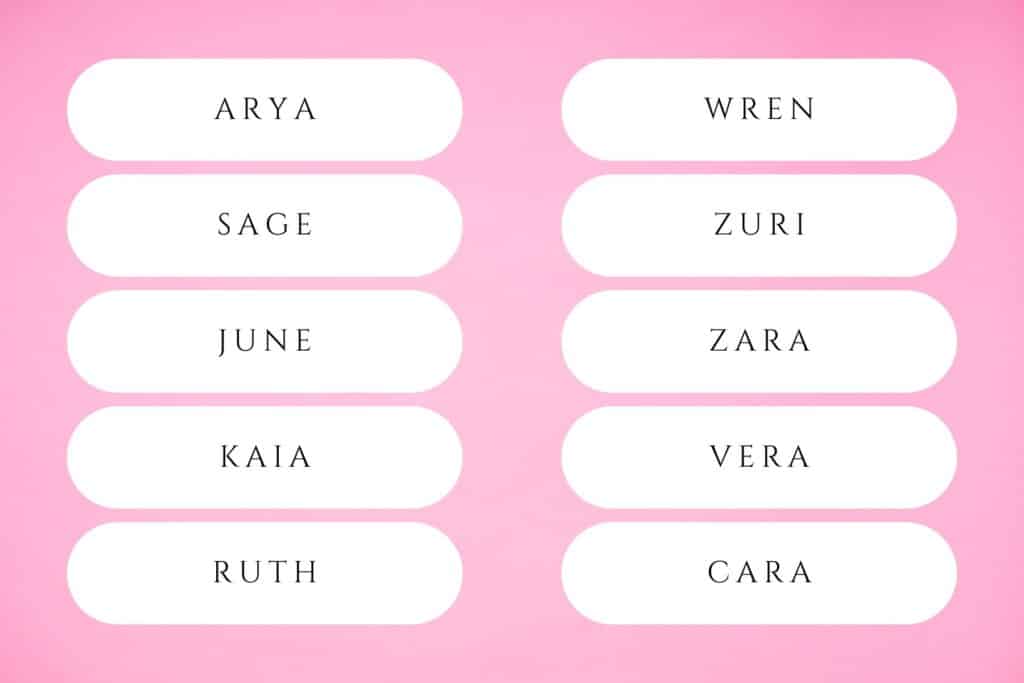
Arya
Origin: Sanskrit
Meaning: Noble
Arya, pronounced uh-REE-yuh or AR-ee-uh, comes directly from the Sanskrit word arya, meaning “noble.” The name was recently popularized in the United States by Arya Stark, a character in “Game of Thrones.”
Sage
Origin: English; French
Meaning: Wise; Judicious; Aromatic herb
Sage, pronounced SAYJ, comes directly from the English word sage of French origin, meaning “wise” and “judicious.” It can also refer to the aromatic herb belonging to the mint family and known for its medicinal and culinary uses.
June
Origin: English; Roman
Meaning: Chief goddess; Protector of women
June, pronounced JOON, comes directly from the name of the sixth month of the year in the Gregorian calendar, which itself was named after Juno, the chief Roman goddess of love, marriage and fertility.
Kaia
Origin: English; Hawaiian; Chinese; Greek
Meaning: Sea; Triumph; Pure
Kaia, pronounced KY-yuh, is an elaborated form of the name Kai, which either means “sea” in Hawaiian or “triumph” in Chinese. It can also be a diminutive of the names Katerina and Katherine, meaning “pure.”
Ruth
Origin: Hebrew
Meaning: Female friend
Ruth, pronounced ROOTH, comes from the Hebrew name Rut and Hebrew word re’ut, meaning “female friend.” In the Bible, Ruth was the great-grandmother of King David and the daughter-in-law of Naomi.
Wren
Origin: English; Latin
Meaning: Small songbird
Wren, pronounced REN, comes directly from the English word for the small brown songbird, derived from the Latin word wrenna. Wrens are known for their small size, chunky bodies and reddish-brown plumage.
Zuri
Origin: Swahili
Meaning: Beautiful; Lovely
Zuri, pronounced ZIR-ree or ZOO-ree, comes directly from the Swahili word zuri, meaning “beautiful.” The name was popularized in the United States by Zuri Ross, a character in “Jessie” played by Skai Jackson.
Zara
Origin: Arabic; Invented
Meaning: Shining; Brilliant; Bright
Zara, pronounced ZAR-uh or ZAIR-uh, is likely a modern variant of Sara, but it can also be linked to the Arabic name Zahra, derived from the Arabic element azhar, meaning “shining,” “brilliant” or “bright.”
Vera
Origin: Russian; Latin
Meaning: Faith; True
Vera, pronounced VEER-uh or VAIR-uh, comes directly from the Russian word vera, meaning “faith,” though it’s also commonly linked to the Latin word verus, meaning “true.” Actress Katie Lowes has a daughter named Vera.
Cara
Origin: Italian; Irish; English
Meaning: Beloved; Friend
Cara, pronounced KAHR-uh or KAIR-uh, comes directly from the Italian word cara, meaning “beloved,” or the Irish word cara, meaning “friend.” It’s also commonly used as a nickname for Carol or Caroline.
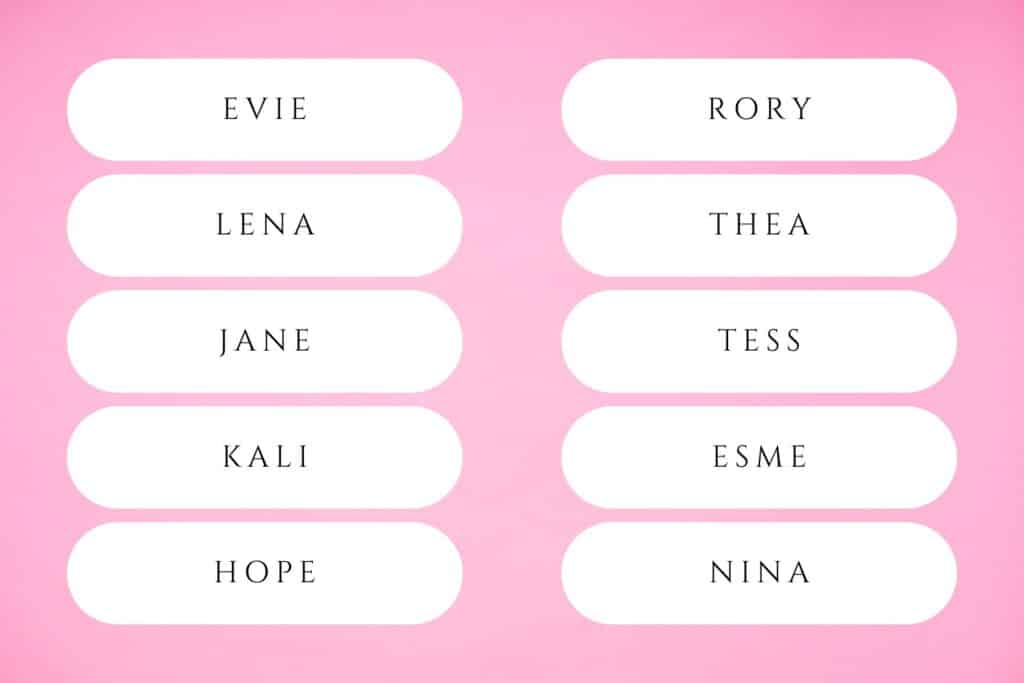
Evie
Origin: English; Invented
Meaning: Breathe; Full of Life; Wished for Child
Evie, pronounced EE-vee, originated as a diminutive of names like Eve, meaning “to breathe” or “to live” in Hebrew, or Evelyn, believed to mean “wished for child” or “bird.” It also relates to the name of an adorable Pokémon (Eevee).
Lena
Origin: English; Hebrew
Meaning: Torch; Corposant; Born in a tower
Lena, pronounced LEE-nuh, is a common diminutive of names that end in -lena, such as Helena, meaning “torch” or “corposant” in Hebrew, and Magdalena, meaning “born in a tower” in Hebrew.
Jane
Origin: English; Hebrew
Meaning: God is gracious
Jane, pronounced JAYN, is the medieval English form of Jehanne, the feminine of John, ultimately from the Hebrew name Yoḥanan, which is composed of the Hebrew elements yo, meaning “God,” and hanan, meaning “gracious.”
Kali
Origin: Sanskrit; Greek
Meaning: The dark one; Beauty
Kali, pronounced KAL-lee or KAH-lee, derives from the Sanskrit word kala, meaning “black.” The Hindu goddess Kali is the fierce destructive form of the wife of Shiva. It can also derive from the Greek word kallos, meaning “beauty.”
Hope
Origin: English
Meaning: Hope; Faith
Hope, pronounced HOHP, is derived directly from the English word hope, which comes from the Old English word hopian, meaning “to have a positive expectation that something desired will happen or be true.”
Rory
Origin: Old Irish
Meaning: Red king
Rory, pronounced ROR-ee, comes from the Old Irish name Ruaidrí, which is composed of the Old Irish elements rúad, meaning “red,” and rí, meaning “king.” It was the name of the last high king of Ireland.
Thea
Origin: Greek
Meaning: Goddess
Thea, pronounced THEE-uh, derives from the Greek word theia, meaning “goddess.” In Greek mythology, Theia was a Titan and also the mother of Helios (the sun), Selene (the moon) and Eos (the dawn).
Tess
Origin: Greek
Meaning: Summer harvest
Tess, pronounced TESS, originated as a diminutive of Teresa or Theresa, ultimately from the Greek word theros, meaning “summer,” or therizo, meaning “to harvest.” It can also be linked to the Greek island of Therasia.
Esme
Origin: Old French; Spanish; Portuguese
Meaning: To love; Emerald
Esme, pronounced EZ-may, derives primarily from the Old French word esmer, meaning “to love,” but can also be a diminutive of the name Esmeralda, which translates to “emerald” in Spanish and Portuguese.
Nina
Origin: Spanish; Quechua; Aymara
Meaning: Little girl; Fire
Nina, pronounced NEE-nuh, comes directly from the Spanish word niña, meaning “little girl,” or Quechua and Aymara word for “fire.” It can also be a diminutive of names ending in -nina, such as Antonina.
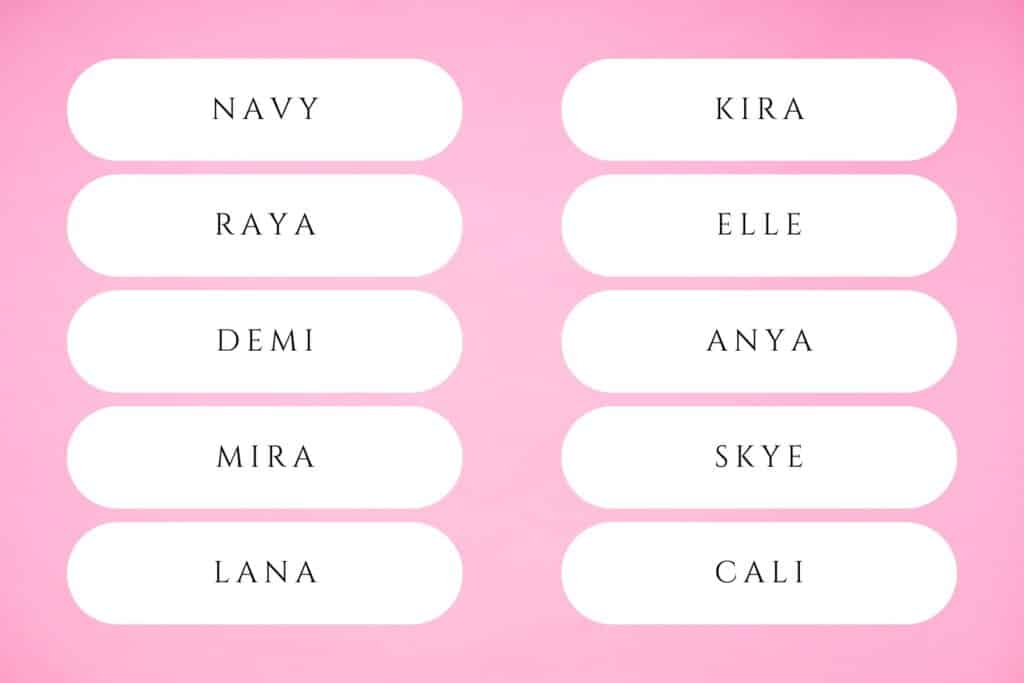
Navy
Origin: English; Old French; Latin
Meaning: Fleet of ships; Blue color
Navy, pronounced NAY-vee, comes directly from the English word for a country's fleet of ships, which ultimately derives from the Old French word navie and Latin word navigia, meaning “fleet of ships.” Navy is also a shade of blue.
Raya
Origin: Latin; Italian; Irish
Meaning: Queen; Little king
Raya, pronounced RAY-uh, is believed to be a diminutive of the name Rayna, which comes from the name Regina, meaning “queen” in Latin and Italian. It can also be a diminutive of Ryan, meaning “little king” in Irish.
Demi
Origin: French; Greek
Meaning: Half; Goddess of harvest
Demi, pronounced DEM-ee, comes directly from the French word for “half,” but can also be a diminutive of Demeter, referring to the ancient Greek goddess of agriculture, harvest and fertility. She was also the mother of Persephone.
Mira
Origin: Sanskrit; Slavic
Meaning: Sea; Ocean; Peace; World
Mira, pronounced MY-ruh or MEER-uh, comes directly from the Sanskrit word mira, referring to the “sea” or “ocean,” but can also be derived from the Slavic element mirŭ, meaning “peace” or “world.”
Lana
Origin: Hawaiian; Spanish; Irish
Meaning: Calm as still waters; Hope; Wool; Money; Little Rock; Precious
Lana, pronounced LAH-nuh, has various meanings depending on its origin. It can translate to “calm as still waters” or “hope” in Hawaiian, “wool” or “money” in Spanish, and “precious” or “little rock” in Irish.
Kira
Origin: Greek; Old Persian; Irish
Meaning: Young; Humiliator; Lord; Black
Kira, pronounced KEER-uh or KY-ruh, is believed to be a feminine variant of Cyrus, which comes from the Greek name Kyros and Old Persian name Kuruš, meaning “young” or “humiliator.” It can also be linked to the Greek word kyrios, meaning “lord,” or Irish word cíar, meaning “black.”
Elle
Origin: French
Meaning: Her; She
Elle, pronounced EL, comes directly from the French pronoun elle, meaning “her” or “she.” It’s also commonly used as a nickname or diminutive of names beginning with El-, such as Eleanor or Elizabeth.
Anya
Origin: Russian; Hebrew
Meaning: Grace; Favor
Anya, pronounced AHN-yuh, is primarily a Russian diminutive of Anna, which is ultimately derived from the Hebrew name Hanna and Hebrew word hanan, meaning “grace” or “favor.”
Skye
Origin: Scottish; English; Old Norse
Meaning: Sky; Cloud; Scottish island
Skye, pronounced SKY, comes from the name of the Isle of Skye in Scotland, but is also considered a variant of the name Sky, which comes from the English word sky, ultimately derived from the Old Norse word ský, meaning “cloud.”
Cali
Origin: Greek; English
Meaning: Beautiful
Cali, pronounced KAL-ee, is often considered a diminutive of names that start with Cal-, such as Calista and Calliope, both of which are derived from the Greek word kallos, meaning “beautiful.”
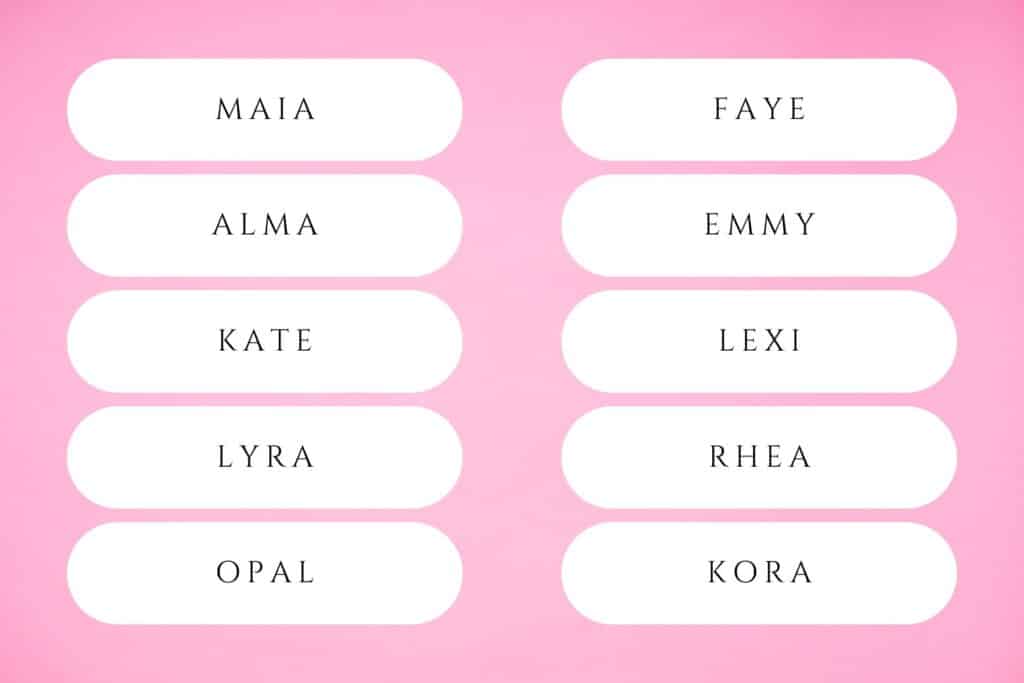
Maia
Origin: Greek
Meaning: Good mother
Maia, pronounced MY-uh, comes directly from the Greek word maia, meaning “good mother.” In Greek mythology, Maia was the oldest of the Pleiades, a daughter of Atlas and Pleione, and mother to Hermes.
Alma
Origin: Hebrew; Spanish; Latin
Meaning: Young woman; The soul; Nourishing
Alma, pronounced AIL-muh or ALL-muh, has various meanings depending on its origin. For example, it means “young woman” in Hebrew and “the soul” in Spanish, and can also derive from the Latin word almus, meaning “nourishing.”
Kate
Origin: Greek
Meaning: Pure; Each of the two
Kate, pronounced KAYT, originated as a diminutive of Katherine, ultimately derived from the Greek word katharos, meaning "pure." Other theories suggest it derives from hekateros, meaning “each of the two.”
Lyra
Origin: Greek; English
Meaning: Lyre; Stringed instrument; Constellation
Lyra, pronounced LY-ruh, is derived from the Greek word lyre, referring to the harp-like stringed musical instrument. It’s also the name of a constellation in the northern sky containing the blue-white star Vega.
Opal
Origin: Sanskrit; English
Meaning: Precious stone; Colorful stone; October birthstone
Opal, pronounced OH-pal or OH-pul, derives from the Sanskrit word upala, meaning "precious stone.” It refers to the unique gemstone known for its characteristic play-of-color and is the birthstone for October.
Faye
Origin: English; Latin
Meaning: Fairy; Magical; Enchanting
Faye, pronounced FAY, derives from the English word fay, meaning “fairy,” the Middle English word faie, meaning “magical” or “enchanted,” and the Latin word fata, referring to the Fates. In Greek mythology, the Fates were three sister goddesses who controlled destiny.
Emmy
Origin: Latin; Germanic
Meaning: Rival; Whole; Great
Emmy, pronounced EM-ee, originated as a diminutive of Emily, which comes from the Latin word aemulus, meaning “rival,” or a nickname for Emma, which comes from the Germanic element irmin, meaning “whole” or “great.”
Lexi
Origin: Greek
Meaning: Helper; Defender of mankind
Lexi, pronounced LEK-see, originated as a diminutive of Alexis, which comes from the Greek word alexo, meaning “to defend” or “help,” or Alexandra, the feminine form of Alexander composed of the Greek elements alexo (“to defend”) and aner (“man”).
Rhea
Origin: Greek
Meaning: Titan goddess; To flow
Rhea, pronounced REE-uh or RAY-uh, comes from the Greek name of the Titan goddess who gave birth to Zeus and other Olympian gods. The name may derive from the Greek word rheo, meaning "to flow."
Kora
Origin: Greek
Meaning: Maiden; Queen of the underworld
Kora, pronounced KOR-uh, is a variant spelling of Cora, which derives from the Greek word kore, meaning “maiden.” In Greek mythology, Kore was an epithet of Persephone, the queen of the underworld.
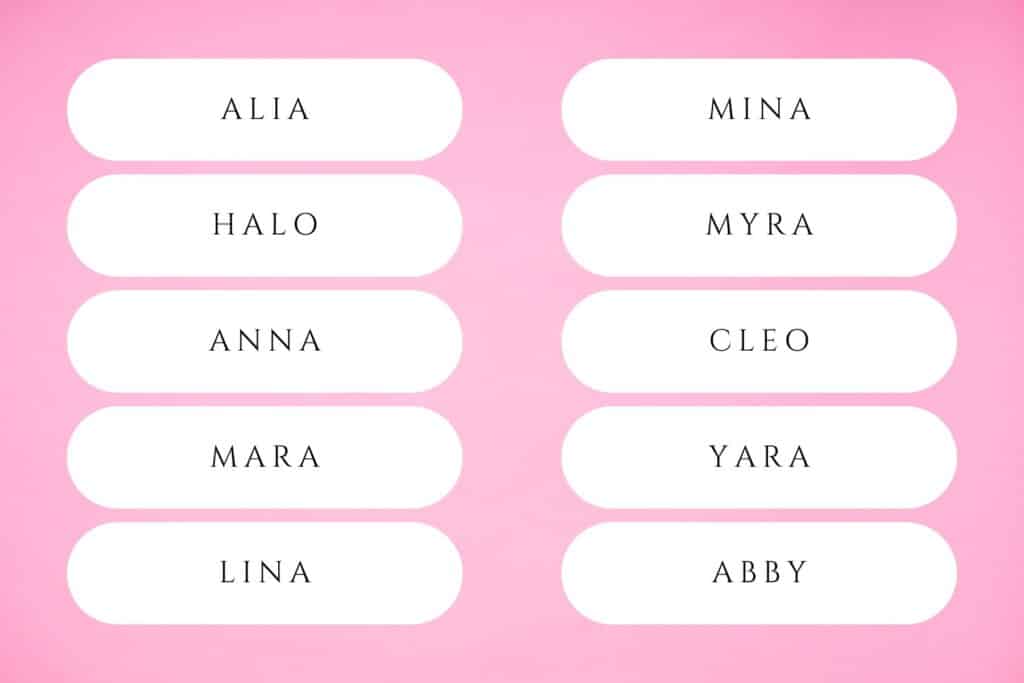
Alia
Origin: Arabic
Meaning: Exalted; Lofty; High
Alia, pronounced AH-lee-uh or AY-lee-uh, is a variant of similar names like Aliyah and is considered a feminine form of Ali. All these names are derived from the same Arabic elements alīy and alā, meaning “to be high” or “lofty.”
Halo
Origin: English; Greek
Meaning: Ring of light; Uncreated light
Halo, pronounced HAY-loh, comes directly from the English word for a ring of light, which ultimately derives from the Greek word halos, meaning "disk of the sun or moon." The halo is a powerful symbol of the Uncreated Light.
Anna
Origin: Hebrew
Meaning: Gracious; Favored
Anna, pronounced AN-nuh, is a variation of Hannah, derived from the Hebrew name Hanna and Hebrew word hanan, meaning “to be gracious.” Anna was the name used in the Greek and Latin Old Testament.
Mara
Origin: Hebrew
Meaning: Bitter; Sea of bitterness
Mara, pronounced MAR-uh or MAIR-uh, is believed to be derived from the Hebrew word marar, meaning “to be bitter.” It can also be linked to the name Mary, meaning “sea of bitterness” or “wished for child.”
Lina
Origin: Multicultural
Meaning: Flax; United; Soft
Lina, pronounced LEE-nuh, is commonly used as a nickname for longer names that end in -lina, but it can also derive from the Greek word linos, meaning “flax,” the Sanskrit word for “united” or the Arabic word lana, meaning “to be soft.”
Mina
Origin: Sanskrit; Persian
Meaning: Fish; Azure; Enamel
Mina, pronounced MEE-nuh, comes directly from the Sanskrit word mina, meaning “fish,” but it can also derive from the Persian word for “azure” and “enamel,” or be used as a nickname for names that end with -mina, such as Adamina, Wilhelmina and Emina.
Myra
Origin: English; Greek
Meaning: Myrrh; Bitter
Myra, pronounced MY-ruh, is sometimes considered a variant of Mary, but other theories link it to the English word myrrh, derived from the Greek word myrrha, referring to the gummy, resinous exudation of certain plants of Arabia and Ethiopia.
Cleo
Origin: Greek
Meaning: Glory
Cleo, pronounced KLEE-oh, derives from the Greek word kleos, meaning “glory” and originated as a short form of Cleopatra, which is composed of the Greek elements kleos and pater, meaning “father.”
Yara
Origin: Persian; Tupi
Meaning: Friend; Helper; Lady of the water
Yara, pronounced YAH-ruh, is sometimes considered a modern variation of Sara, but can also derive from the Persian element yar, meaning “friend” and “helper,” or the Tupi elements y, meaning “water,” and iara, meaning “lady.”
Abby
Origin: Hebrew
Meaning: My father’s joy
Abby, pronounced AB-ee, originated as a diminutive of Abigail, which comes from the Hebrew name ʾAviḡayil and is composed of the Hebrew elements av, meaning “father,” and gil, meaning “joy.”
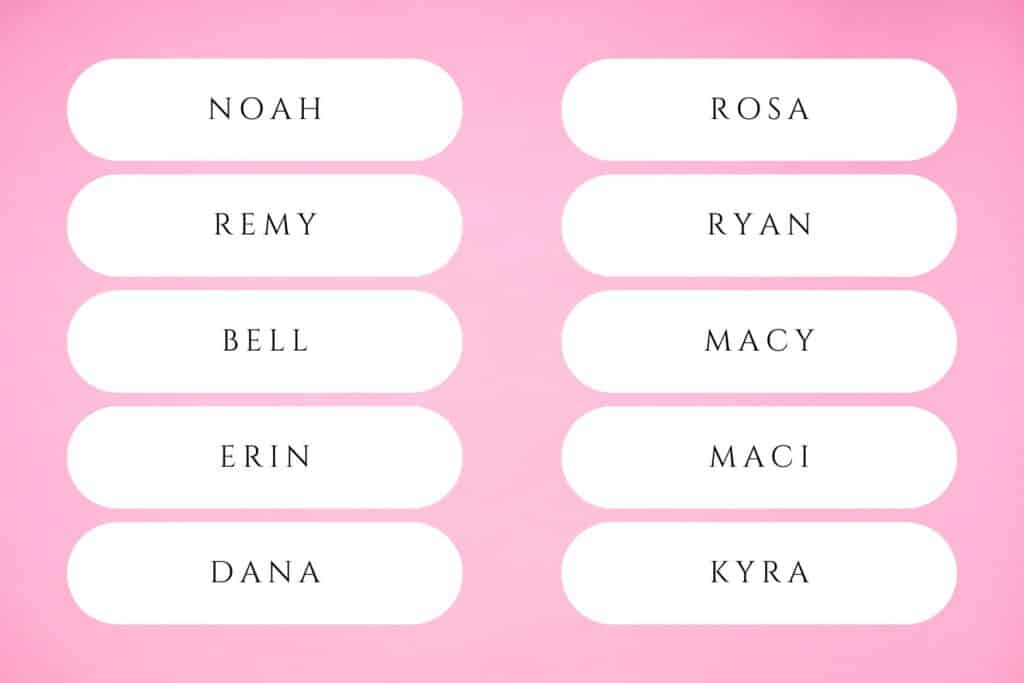
Noah
Origin: Hebrew
Meaning: Rest; Repose; Motion
Noah, pronounced NO-uh, comes directly from the Hebrew name Noaḥ and Hebrew word nuah, meaning “rest” or “repose,” but it can also refer to the Heberw name No’a, meaning “motion.” Noah is the hero of the biblical Flood story in the Old Testament book of Genesis.
Remy
Origin: Latin; English
Meaning: Oarsman; Rower; Settlement on the stream
Remy, pronounced REM-ee or RAY-mee, derives from the Latin name Remigius, meaning "oarsman" or "rower." It can also be a diminutive of Remington, which comes from an English place name meaning "settlement on the Riming stream."
Bell
Origin: Italian; Hebrew
Meaning: Beautiful; Oath to God; My God is an oath
Bell, pronounced BELL, either comes from the Italian word bella, meaning “beautiful,” or is a diminutive for the name Isabel, itself a derivative of Elizabeth and Elisheva, meaning “oath to God” or “my God is an oath” in Hebrew.
Erin
Origin: Irish Gaelic
Meaning: Ireland
Erin, pronounced AIR-in, is the Anglicized form of the Irish name Éireann, which comes from the Irish Gaelic name Éire, meaning “Ireland.” It’s a beautiful way to honor both the country and culture.
Dana
Origin: Persian; Hebrew
Meaning: Wise; God is my judge
Dana, pronounced DAY-nuh or DAN-uh, comes directly from the Persian word dana, meaning “wise,” though it can also be considered a feminine diminutive of Daniel, meaning “God is my judge” in Hebrew.
Rosa
Origin: Latin
Meaning: Rose; Red flower
Rosa, pronounced ROH-zuh, comes directly from the Latin word rosa, referring to the rose flower. Roses are an international symbol of love, often used to express romantic affection, friendship and admiration.
Ryan
Origin: Irish
Meaning: Little King; Little Queen
Ryan, pronounced RYE-in, is the Anglicized form of the Irish name Rian, which is believed to derive from the Old Irish element rí, meaning “king,” combined with a diminutive suffix, ultimately meaning “little king.”
Macy
Origin: English; French
Meaning: From Massy
Macy, pronounced MAY-see, originated as an English surname derived from the French place name Massy and Latin name Maccius. Its prominence in the United States is partly tied to the department store.
Maci
Origin: English; French
Meaning: From Massy
Maci, pronounced MAY-see, is a contemporary spelling variant of Macy, ultimately derived from the French place name Massy and Latin given name Maccius. Other common variants include Macie and Mayzee.
Kyra
Origin: Greek; Old Persian; Irish
Meaning: Young; Humiliator; Lord; Black
Kyra, pronounced KYE-ruh, is a variant of Kira, which is believed to be a feminine variant of Cyrus, derived from the Old Persian name Kuruš, meaning “young” or “humiliator.” It can also be linked to the Greek word kyrios, meaning “lord,” or Irish word cíar, meaning “black.”
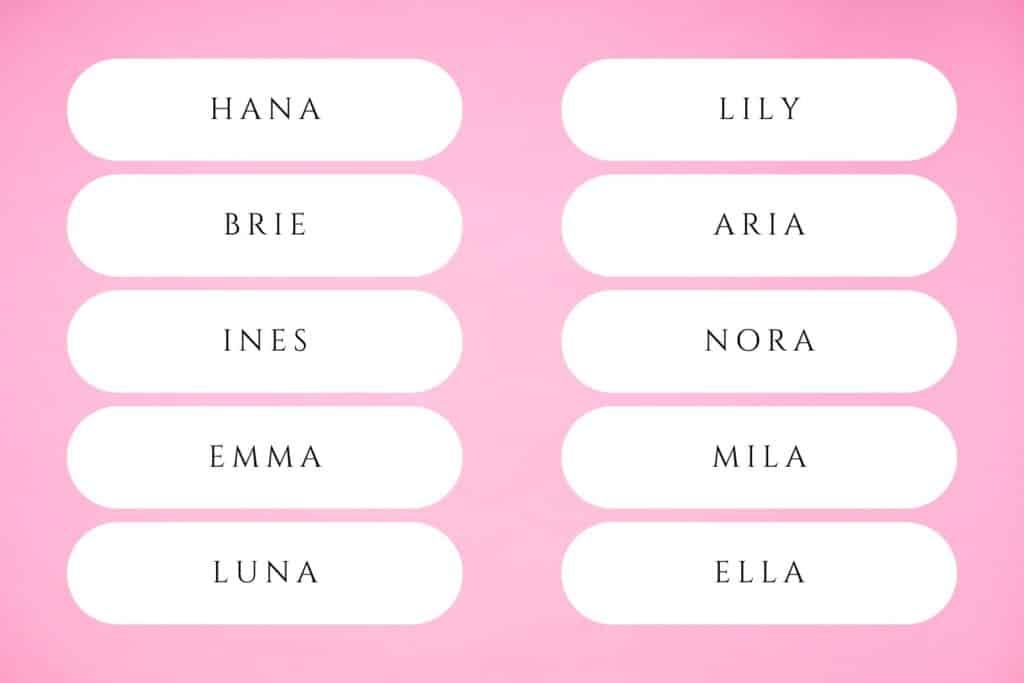
Hana
Origin: Hebrew; Arabic; Japanese; Korean
Meaning: Gracious; Bliss; Flower; One
Hana, pronounced HAN-uh, is a variant of Hannah derived from the Hebrew word hanan, meaning “to be gracious.” It can also derive from the Arabic root hanaʾa, meaning “bliss,” the Japanese word hana, meaning “flower,” or Korean word for “one.”
Brie
Origin: Germanic; Hebrew
Meaning: God is my strong man; High; Hill; Mighty; Powerful
Brie, pronounced BREE, is commonly used as a diminutive of names like Brianna, meaning “hill,” “high,” “mighty” or “powerful” in German, and Gabriella, meaning “God is my strong man” in Hebrew.
Ines
Origin: Greek; Latin; Spanish
Meaning: Chaste; Pure; Holy; Lamb
Ines, pronounced EE-nes, is the Spanish variation of Agnes, which comes from the Greek name Hagne and Greek word hagnos, meaning “chaste,” “pure” or “holy.” It can also derive from the Latin word agnus, meaning “lamb.”
Emma
Origin: Germanic
Meaning: Whole; Great; Universal
Emma, pronounced EM-muh, comes from the Germanic elements irmin and ermun, meaning “whole,” “great” or “universal.” It has been a top-2 girl’s name in the United States every year since 2012.
Luna
Origin: Roman; Latin
Meaning: Moon
Luna, pronounced LOO-nuh, comes directly from the Latin word luna, meaning “moon.” Luna was the Roman goddess of the moon who was often depicted wearing a crown with a crescent moon.
Lily
Origin: English; Latin
Meaning: Lily flower
Lily, pronounced LIL-ee, comes directly from the English word for the flower, ultimately derived from the Latin word lilium. Lilies are primarily known to symbolize love, purity, fertility and rebirth in many cultures.
Aria
Origin: Italian; English; Old Persian
Meaning: Air; Solo song; Noble
Aria, pronounced AHR-ee-uh or AIR-ee-uh, comes directly from the Italian word aria, meaning “air.” In English, an aria refers to a solo song, typically found in operas. It can also derive from the Old Persian word ariya, meaning “noble.”
Nora
Origin: Arabic; Latin; Occitan
Meaning: Light; Honor; The other Aenor
Nora, pronounced NOR-uh, is believed to derive from the Arabic word nūr, meaning “light,” but is also commonly used as a diminutive of names like Honora, meaning “honor” in Latin,” and Eleanor, meaning “the other Aenor” in Occitan.
Mila
Origin: Slavic
Meaning: Gracious; Dear
Mila, pronounced MEE-uh or MEE-luh, comes from the Slavic element milŭ, meaning “gracious” or “dear.” It’s commonly used as a nickname for names that end with -mila, such as Camila, Yamila or Ludmila.
Ella
Origin: Spanish; Germanic
Meaning: She; Other
Ella, pronounced EL-lah, comes directly from the Spanish word ella, meaning “she,” but other theories link it to the Germanic element alles, meaning “other.” It’s also used as a diminutive of Eleanor and Ellen.
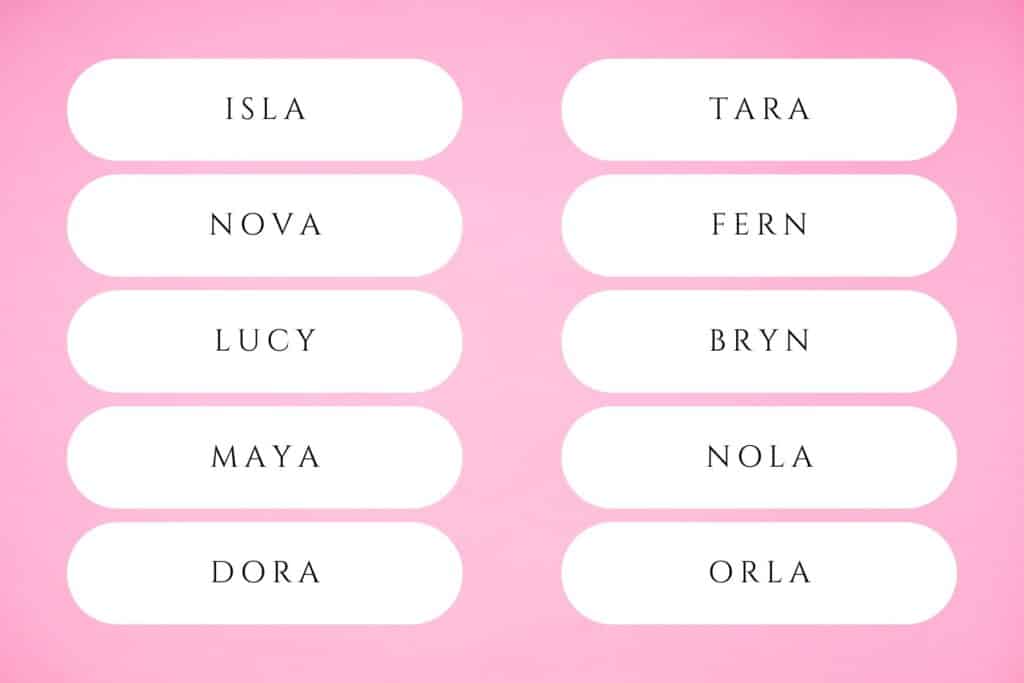
Isla
Origin: Spanish; Scottish
Meaning: Island
Isla, pronounced EYE-luh, comes directly from the Spanish word isla, meaning “island.” It’s also a variant of the Scottish name Islay, derived from the island of Islay, which lies off of the west coast of Scotland
Nova
Origin: Latin; English
Meaning: New; Bright star
Nova, pronounced NO-vuh, derives from the Latin word novus, meaning “new.” In astronomy, a nova is a sudden, dramatic brightening of a star, typically becoming thousands of times brighter in a short period.
Lucy
Origin: Latin; English
Meaning: Light
Lucy, pronounced LOO-see, is the English form of Lucia, which derives from the Latin word lux, meaning “light.” St. Lucy is the patron saint of the blind, those with eye problems, and the island of Saint Lucia.
Maya
Origin: Sanskrit; Hebrew; Greek
Meaning: Illusion; Magic; Water; Good mother
Maya, pronounced MY-uh, comes directly from the Sanskrit word māyā, meaning “illusion” or “magic,” but it can also derive from the Hebrew word mayim, meaning “water,” or the Greek word maia, meaning “good mother.”
Dora
Origin: Greek
Meaning: Gift; Gift of God; God’s gift
Dora, pronounced DOR-uh, is believed to be derived from the Greek word doron, meaning “gift.” It’s a common diminutive of names like Theodora, Isidora and Dorothea, meaning “God’s gift” or “gift of God.”
Tara
Origin: Sanskrit; Irish
Meaning: Star; Elevated place
Tara, pronounced TAR-uh or TAIR-uh, comes directly from the Sanskrit word tārā, meaning “star.” Other theories suggest that it’s the Anglicized form of Teamhair, an Irish place name meaning “elevated place.”
Fern
Origin: Old English
Meaning: Vascular plant
Fern, pronounced FURN, comes directly from the English word for the feathery-leaved plant, ultimately derived from the Old English word fearn. Ferns are one of the oldest groups of plants on Earth.
Bryn
Origin: Welsh
Meaning: Hill; Mound
Bryn, pronounced BRIN, derives from the Welsh word bryn, meaning “hill” or “mound.” It was popularized in the United States through actress Brynn Thayer, best known for her role on “One Life to Live.”
Nola
Origin: English; Modern
Meaning: New Orleans
Nola, pronounced NO-luh, was likely popularized as a tribute to New Orleans, Louisiana, sometimes referred to as NOLA. It can also be a product of similar-sounding names like Lola, Viola and Nikola.
Orla
Origin: Old Irish; English
Meaning: Golden princess
Orla, pronounced OR-luh, is the Anglicized form of the Irish name Órlaith, which is composed of the Old Irish elements ór, meaning "gold," and flaith, meaning "ruler” or “princess.” Therefore, it means “golden princess.”
Gwyn
Origin: Welsh
Meaning: White; Fair; Blessed
Gwyn, pronounced GWIN, derives from the Welsh word gwyn, meaning "white," "fair" or "blessed." It can also be a diminutive or nickname for names like Gwyneth, Gwyndolyn and Gwyneira.
Not Interested In 4 Letter Girl Names?

4 letter names for girls are a great place to start your baby-naming journey.
But we understand that every parent is different. And while short girl names are popular in the U.S., some parents might be more interested in a longer name for their daughter — or even a hyphenated name.
Like going with Hannah instead of Anna. Or Gabriella and Isabella instead of Ella.
If our collection of four-letter girl names didn't quite capture what you're looking for, don't worry! The perfect name is out there waiting for you. And Mod Moms Club is here to help you narrow it down.
ALSO ON MOD MOMS CLUB: 125+ Mom-Inspired Baby Names for Mama's Little Girl
If you truly get stuck, don’t forget about our baby name generator, which is designed to help you quickly browse baby names inspired by your personal preferences.












